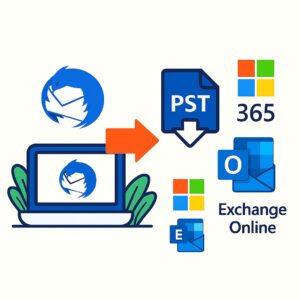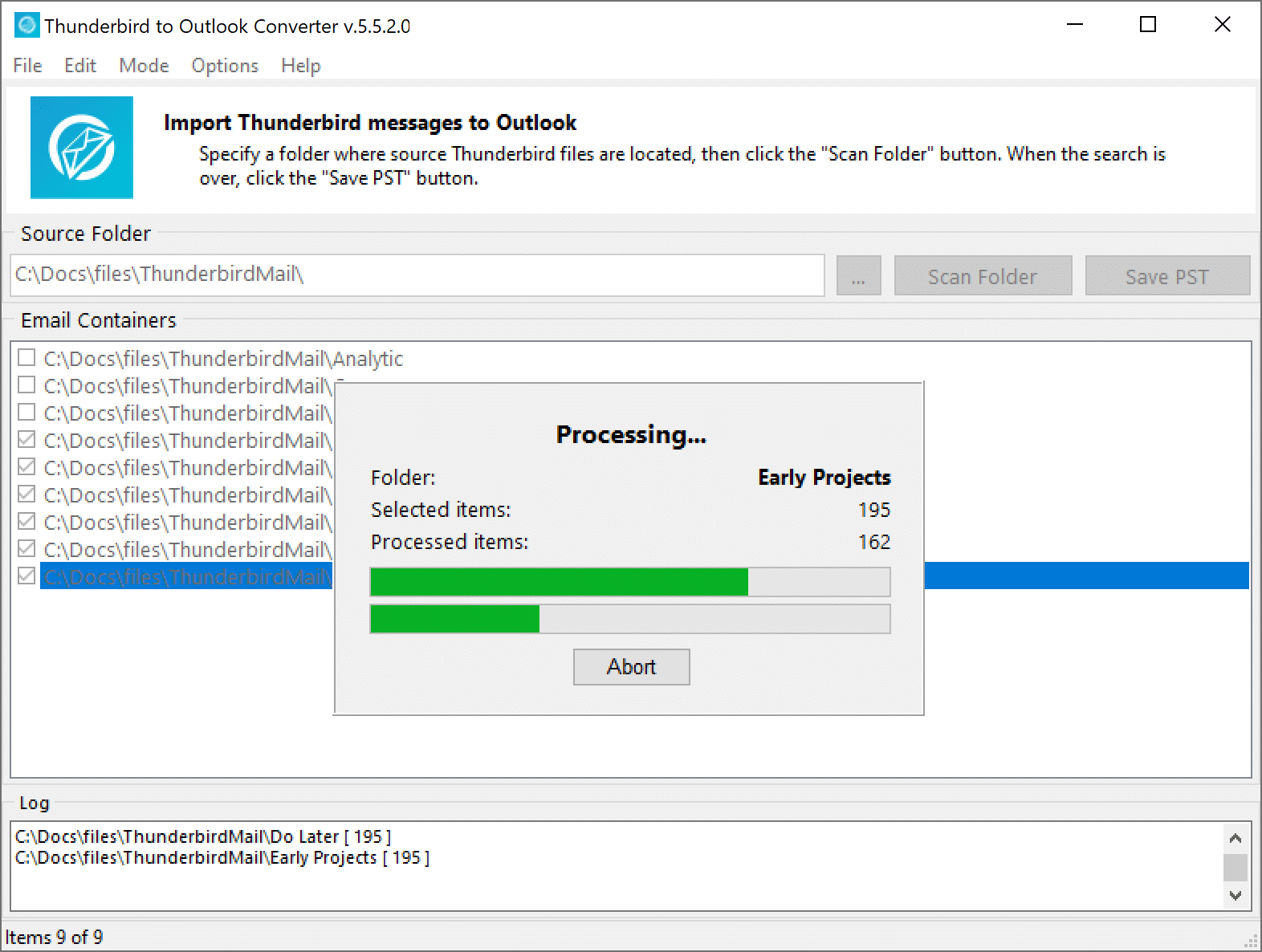Migrating from Mozilla Thunderbird to Microsoft Outlook is not just a technical task, it’s a strategic decision that can significantly improve productivity, security, and integration across your organization. While Thunderbird is a capable email client, Outlook offers enterprise-grade features that align better with modern business needs. Therefore, choosing the right migration tool is essential.
The Thunderbird to Outlook Converter is designed to make this transition seamless. In the following sections, we’ll explore a variety of real-world use cases where this tool adds measurable value for businesses, IT teams, and professionals alike.
Small Businesses Upgrading to Microsoft 365

Consequently, switching to Microsoft Outlook, especially as part of the Microsoft 365 ecosystem, becomes a logical and strategic upgrade. Outlook not only offers a more robust email experience but also integrates seamlessly with tools like Teams, SharePoint, OneDrive, and the Microsoft Office suite. This integration empowers teams to work more efficiently, communicate more clearly, and manage projects with greater precision.
Use Case:
Consider a creative agency with 15 employees that has been using Thunderbird for several years. As the team begins to collaborate more closely with external clients and partners, they realize the need for a unified communication platform. After evaluating their options, they choose Microsoft 365 for its cloud-based infrastructure, shared calendars, and real-time document collaboration.
However, they face a challenge: their Thunderbird mailboxes contain years of client correspondence, project updates, and important attachments. Manually transferring this data would be time-consuming and risky. Therefore, they turn to the Thunderbird to Outlook Converter to handle the migration. The tool allows them to convert all mailboxes to PST format in bulk, preserving folder hierarchies, embedded images, and metadata such as timestamps and sender information.
The migration is completed over a weekend, minimizing disruption. By Monday morning, every employee is up and running on Outlook, with full access to their historical emails.
Why It Matters:
This transition not only streamlines internal communication but also enhances external professionalism. Moreover, the agency now benefits from enterprise-grade security, mobile access across devices, and centralized IT management. In the long run, this upgrade supports scalability, improves client responsiveness, and positions the business for future growth.
Freelancers and Consultants Seeking Professionalism

Use Case:
A freelance IT consultant works with several enterprise clients across different time zones. Over the years, they’ve accumulated thousands of emails in Thunderbird, some containing sensitive project details, others with critical attachments. As their client base grows, they begin receiving Outlook calendar invites, shared OneDrive links, and Teams meeting requests. Thunderbird’s lack of native support for these features creates friction and delays.
To eliminate these roadblocks, the consultant decides to migrate their entire email archive to Outlook. Using the Thunderbird to Outlook Converter, they convert all MBOX files to PST format in one go. The tool ensures that folder structures are preserved, attachments remain intact, and even embedded images render correctly in Outlook.
After the migration, the consultant is able to respond to meeting invites directly, sync calendars across devices, and manage client communications with greater precision. They also gain access to Outlook’s advanced search and categorization features, which help them stay organized across multiple engagements.
Why It Matters:
This upgrade isn’t just about convenience – it’s about perception. Clients notice the difference when communication is timely, formatted professionally, and integrated with their own systems. Moreover, the consultant now spends less time troubleshooting email compatibility and more time delivering value. In a competitive freelance market, these small shifts can lead to stronger referrals, repeat contracts, and higher rates.
IT Departments Standardizing Email Platforms

While Thunderbird may have been adopted in the past for its open-source flexibility or cost savings, it lacks centralized management features and native integration with enterprise ecosystems. Outlook, on the other hand, offers robust administrative controls, seamless compatibility with Microsoft Exchange and Microsoft 365, and a unified experience across devices and departments.
Use Case:
An IT department at a regional insurance company is preparing for a company-wide infrastructure upgrade. Over the years, different branches adopted different email clients, some using Thunderbird, others using Outlook or webmail. This fragmentation has led to increased support tickets, inconsistent backup procedures, and difficulty enforcing security protocols.
To streamline operations, the IT team decides to standardize all users on Microsoft Outlook. However, they face a significant hurdle: over 250 employees are still using Thunderbird, each with years of archived emails, custom folder structures, and critical attachments.
Rather than attempting a manual migration, which would be time-consuming and prone to errors, they deploy the Thunderbird to Outlook Converter. The tool’s batch processing feature allows them to convert all Thunderbird profiles to PST format in a single operation. It automatically detects MBOX files, preserves folder hierarchies, and ensures that metadata like read/unread status, timestamps, and sender information remain intact.
The migration is scheduled over a weekend to minimize disruption. By Monday morning, all 250 users are fully operational in Outlook, with their historical emails seamlessly integrated and ready to use.
Why It Matters:
This consolidation delivers immediate and long-term benefits. First, it simplifies user onboarding and training, since everyone is now using the same interface. Second, it reduces the IT team’s workload by eliminating the need to support multiple platforms. Most importantly, it enables consistent enforcement of security policies, such as multi-factor authentication, data loss prevention (DLP), and centralized backups.
From a strategic standpoint, standardizing on Outlook also positions the organization to adopt future technologies more easily, whether that’s Microsoft Teams, SharePoint, or cloud-based compliance tools. In short, the migration isn’t just a technical upgrade, – it’s a foundational step toward a more secure, scalable, and manageable IT environment.
Mergers and Acquisitions Requiring Email Consolidation

In these high-stakes scenarios, speed and accuracy matter. IT teams must migrate data quickly, securely, and without disrupting day-to-day business. That’s precisely where the Thunderbird to Outlook Converter proves its worth.
Use Case:
A mid-sized enterprise acquires a fast-growing startup in the fintech space. While the parent company uses Microsoft Outlook across its departments, the startup had been relying on Thunderbird for its internal communications. Their Thunderbird mailboxes contain critical client correspondence, product development notes, and investor updates, none of which can be lost or delayed.
To ensure a smooth transition, the IT department is tasked with migrating all Thunderbird accounts into the corporate Outlook environment. Because the startup’s team is still actively working during the transition, downtime must be minimized. Using the converter’s batch mode, the IT team processes dozens of Thunderbird profiles simultaneously. The tool preserves folder structures, attachments, and metadata, ensuring that every email lands in the correct Outlook mailbox without corruption or duplication.
The migration is completed over a single weekend. By Monday, the startup’s employees are fully integrated into the parent company’s Outlook system, with access to both legacy and current emails.
Why It Matters:
This kind of seamless migration accelerates team integration and avoids the pitfalls of siloed communication. Employees can immediately collaborate using shared calendars, Teams meetings, and centralized contact lists. Additionally, IT gains full control over email retention policies, security protocols, and backup procedures.
From a strategic perspective, consolidating email platforms during M&A activity isn’t just about convenience, it’s about enabling synergy. When communication flows freely across newly combined teams, innovation accelerates, onboarding becomes smoother, and the cultural transition feels less disruptive.
Legal and Compliance Teams Archiving Emails

On the other hand, Thunderbird stores emails in MBOX format, which isn’t compatible with many legal platforms. So, when teams need to archive or hand over email records, converting those files becomes a critical step.
Use Case:
A mid-sized law firm has been using Thunderbird for years to manage internal and client communications. Now, they’re moving to a new document management system that only supports Outlook PST files. They also need to prepare for a regulatory audit that requires full access to archived emails, including attachments and timestamps.
Instead of manually exporting and reformatting thousands of messages, the firm uses the Thunderbird to Outlook Converter. The tool quickly converts all their Thunderbird mailboxes into PST files, keeping folder structures intact and preserving every detail, from sender info to read/unread status.
Once the conversion is complete, the firm uploads the PST files into their new system. Everything is searchable, organized, and ready for review.
Why It Matters:
This kind of migration isn’t just about convenience, it’s about staying compliant and protecting your organization. With emails properly archived in Outlook format, legal teams can respond to audits faster, retrieve evidence when needed, and avoid costly delays. Plus, having everything in one standardized format makes future transitions and integrations much easier.
In short, converting Thunderbird emails to Outlook PST helps legal and compliance teams stay organized, meet regulations, and be ready for whatever comes next.
System Administrators Automating Bulk Migrations

Whether you’re working in education, government, or enterprise IT, having the right tool to handle bulk migrations can save days of work and prevent countless headaches. The Thunderbird to Outlook Converter is built with these challenges in mind. It supports batch mode and command-line automation, so you can migrate multiple accounts in one go, without babysitting the process.
Use Case:
A university IT department is preparing for the new academic year. They’ve decided to standardize all student email accounts on Microsoft Outlook to align with campus-wide Microsoft 365 adoption. However, around 600 students are still using Thunderbird, and their mailboxes contain important academic records, project submissions, and personal correspondence.
Manually converting each account would take weeks and tie up valuable IT resources. Instead, the team uses the converter’s batch processing feature. They load all Thunderbird profiles into the tool, configure the settings once, and let the automation do the rest. The tool processes each mailbox, converts it to PST format, and ensures that folders, attachments, and timestamps are preserved.
The entire migration is completed over a weekend. By Monday, students log into Outlook and find their email history exactly where they left it, organized, intact, and ready to use.
Why It Matters:
For system admins, automation isn’t just a convenience, it’s a necessity. It reduces manual effort, minimizes the risk of human error, and ensures consistent results across hundreds of accounts. Plus, it frees up time to focus on other critical tasks like network security, user onboarding, and system upgrades.
In large-scale environments, having a reliable migration tool that “just works” can make all the difference. It turns a daunting project into a smooth, predictable process, and that’s exactly what IT teams need.
Cross-Platform Transitions (Linux/Mac to Windows)

Thunderbird stores emails in a format that Outlook doesn’t recognize. So unless you want to leave your entire inbox behind, you’ll need a way to bring your messages with you. That’s exactly what the Thunderbird to Outlook Converter is built for.
Use Case:
A software developer has been working on macOS for years, using Thunderbird to manage everything from client feedback to bug reports. They land a new role at a company that runs entirely on Windows and uses Outlook for all internal communication. To hit the ground running, they need access to their old emails, some of which contain important project history and contacts.
Instead of manually exporting and reformatting files, the developer uses the converter to move everything over. The tool scans their Thunderbird profile, converts the MBOX files to PST format, and keeps everything organized, folders, attachments, timestamps, even read/unread status. Within an hour, their Outlook inbox looks just like their old Thunderbird setup, only now it’s fully compatible with their new environment.
Why It Matters:
Changing platforms shouldn’t mean starting from scratch. By migrating emails properly, users keep their communication history intact, avoid losing important information, and adapt faster to new systems. Whether it’s a developer, designer, or consultant, having a smooth transition means less stress and more focus on what really matters, doing great work.
Recovering Data from Damaged Thunderbird Profiles

Instead of trying to manually repair broken profiles or dig through system folders, IT teams can use the Thunderbird to Outlook Converter to extract MBOX files, even from damaged installations. The tool scans the available data, pulls out usable content, and converts it into Outlook’s PST format.
Use Case:
An IT technician at a small accounting firm receives a call from a panicked employee. Their Thunderbird profile won’t open, and they need access to several years of client emails for an upcoming audit. The technician locates the corrupted profile folder and uses the converter to extract the MBOX files. Within minutes, they convert the data to PST and import it into Outlook.
The employee opens Outlook and finds their entire email history restored, complete with folders, attachments, and timestamps.
Why It Matters:
Quick recovery keeps business moving. When email data disappears, teams lose time, trust, and sometimes money. By using a reliable tool to recover and convert Thunderbird profiles, IT professionals can restore access without delay. This approach protects business continuity and gives users peace of mind, especially when deadlines are tight and the stakes are high.
Integrating Thunderbird Data into Microsoft Exchange or 365

Outlook uses PST files, which work perfectly with Microsoft Exchange and Microsoft 365. Thunderbird, however, stores emails in MBOX format, which isn’t compatible. That’s where the Thunderbird to Outlook Converter comes in. It bridges the gap, making sure your legacy data fits into your new environment without hassle.
Use Case:
A mid-sized tech company decides to switch to Microsoft 365 to unify its tools and improve remote collaboration. Most departments already use Outlook, but the development team has stuck with Thunderbird for years. Their mailboxes contain bug reports, client feedback, and internal discussions that can’t be lost.
To make the transition smooth, the IT team uses the converter to migrate all Thunderbird mailboxes to PST format. Once converted, they upload the PST files to Exchange Online, where Outlook can access them instantly. The developers log into their new accounts and find everything in place: folders, attachments, and even flagged messages.
Why It Matters:
This kind of integration makes life easier for everyone. Employees don’t have to juggle multiple email systems. IT teams gain centralized control over backups, retention policies, and security settings. And the company benefits from a unified platform that supports growth, compliance, and collaboration.
Bringing Thunderbird data into Microsoft 365 isn’t just a technical task, – it’s a smart move that sets your organization up for long-term success.
Hybrid Environments and Reverse Migration Planning

Even if your team isn’t ready to fully switch to Outlook, converting Thunderbird emails now can save time later. It also makes it easier to archive, share, or integrate messages into other tools that support PST files.
Use Case:
A nonprofit organization uses Thunderbird for day-to-day operations. It’s simple, cost-effective, and works well for their internal team. However, they frequently collaborate with government agencies and corporate sponsors, most of whom use Outlook. When these partners request archived email records, the nonprofit struggles to share them in a compatible format.
To solve this, the IT coordinator uses the Thunderbird to Outlook Converter. They convert selected Thunderbird mailboxes into PST files and send them to partners who can open them directly in Outlook. The process is quick, and the converted emails retain their original structure, attachments, and timestamps.
Why It Matters:
This kind of flexibility makes collaboration smoother. It removes technical barriers and helps teams focus on the work, not the tools. Plus, having emails in Outlook format means the nonprofit can easily switch platforms in the future if needed. Whether you’re planning a full migration or just need to share data across systems, converting Thunderbird emails to PST gives you options, and options are always good.
Why Thunderbird to Outlook Converter is the Ideal Solution
When it comes to email migration, businesses and IT teams need more than just a basic tool, they need something that’s fast, reliable, and built to handle real-world challenges. The Thunderbird to Outlook Converter checks all those boxes. Whether you’re moving a single mailbox or hundreds of accounts, this tool makes the process smooth and stress-free.
Unlike manual methods that require technical know-how and hours of effort, this converter simplifies everything. You don’t need to worry about losing attachments, breaking folder structures, or missing important metadata. The tool takes care of it all, so you can focus on what matters, getting your team up and running in Outlook without delays.
What Makes it Stand Out:
- Unlimited mailbox conversions
You can convert as many Thunderbird profiles as you need – there’s no cap. This is especially useful for growing businesses, universities, and IT departments managing large user bases. - Batch processing and automation
The tool supports bulk migration and command-line automation. That means you can migrate dozens or even hundreds of accounts in one go, saving time and reducing manual work. - Accurate folder and metadata preservation
Every detail matters. The converter keeps your folder structure intact and preserves timestamps, sender info, read/unread status, and attachments, so your Outlook inbox looks just like your Thunderbird setup. - Fast, reliable, and user-friendly interface
You don’t need to be a tech expert to use it. The interface is clean and intuitive, and the conversion process is quick, even for large mailboxes.
Migrating email shouldn’t be a gamble. With this converter, you get peace of mind knowing your data will arrive safely and completely. Whether you’re upgrading your systems, recovering from a crash, or preparing for an audit, this tool gives you the confidence to move forward without missing a beat.
Frequently Asked Questions (FAQ)
Users often search for step-by-step instructions. The most efficient method is using a dedicated tool like Thunderbird to Outlook Converter, which automates the process and preserves folder structure, attachments, and metadata.
Yes, you can. Thunderbird stores emails in MBOX format, while Outlook uses PST. A specialized converter bridges this gap, allowing seamless migration without data loss.
While manual methods exist, such as using IMAP and Gmail as an intermediary, they are time-consuming and error-prone. Most users prefer a reliable paid tool for accuracy and speed.
No, Outlook does not natively support MBOX files. You must convert them to PST format using third-party software before importing them into Outlook.
Searches for “best converter” are common. Thunderbird to Outlook Converter is consistently recommended for its speed, reliability, and ability to handle large volumes of email.
Yes, batch migration is supported by advanced tools. This is especially useful for IT departments handling multiple user profiles.
A top concern for users. With the right converter, attachments, HTML formatting, and metadata (like timestamps and sender info) are fully preserved.
Migration time depends on mailbox size and system performance. However, with optimized software, even large mailboxes can be converted in under an hour.
Yes, the software is compatible with all modern Windows versions, including Windows 11, making it suitable for both personal and enterprise use.
Security is a major concern. Reputable tools like Thunderbird to Outlook Converter operate locally, without uploading data to the cloud, ensuring full privacy and control.
Migration as a Strategic Upgrade
In conclusion, migrating from Thunderbird to Outlook is more than a technical necessity, it’s a strategic upgrade. Whether you’re a freelancer, a growing business, or an enterprise IT manager, the Thunderbird to Outlook Converter empowers you to make this transition smoothly and confidently.
Ready to take the next step?
Explore the full capabilities of the Thunderbird to Outlook Converter and elevate your email experience today.
Would you like me to generate a matching FAQ section or help you structure this into your CMS with schema markup for even better SEO?






